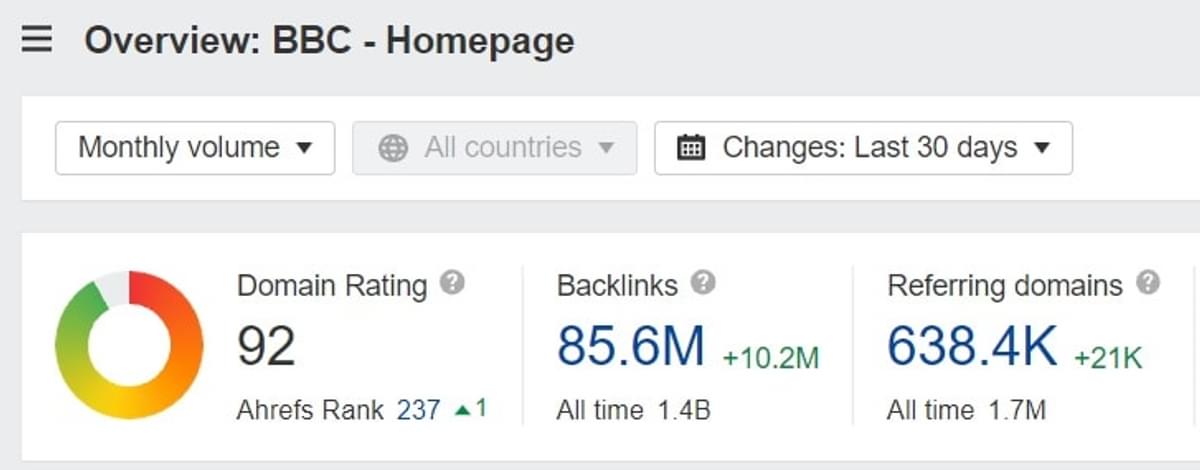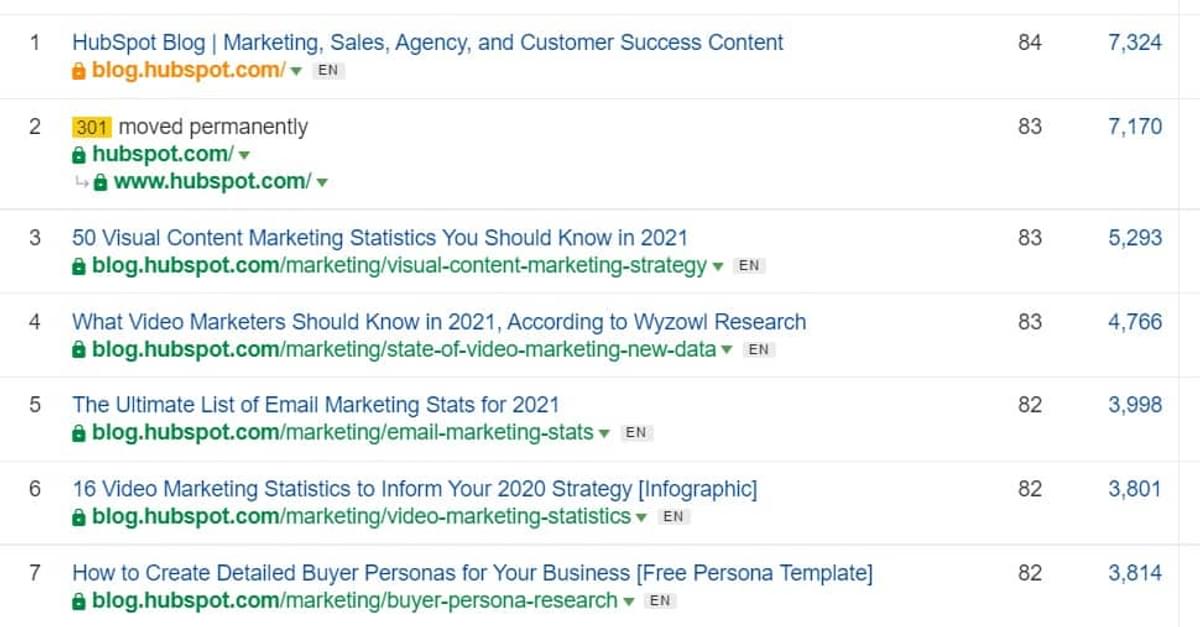
So, you want to increase the search engine rankings of a page on your website? Then it may help to send some link juice its way.
You have two options for how to do this:
- The easy method is to direct your website’s existing link juice to the page you want to rank.
- The difficult method is to generate new incoming backlinks to your content or website.
Both strategies can be highly effective. You just need to know how to perform them effectively. This is something we specialize in at LinkBuilder.io.

What Is Link Juice?
Link juice (also known as link equity) is the name given to the value or authority a page passes on when it links to another page.
This value can help increase a page’s search engine rankings. Incoming links are an important ranking factor; the more link equity a page has, the more likely it is to show up on search engines.
But not all links pass on the same amount of link juice. The amount of authority a link provides depends on many factors. We’ll discuss these later in the article.
Link Juice
Link juice is a non-technical term—you’re unlikely to find the phrase anywhere in the Google algorithm.
But the idea behind it—that links pass on value and that some links pass on more value than others—is absolutely true.
Link juice, link equity, or whatever else you want to call it, is therefore something you should consider when building links.
Is Link Juice the same as PageRank?
Link juice is not the same as PageRank. The latter term is a metric Google uses to determine how a site should rank based on its backlink profile.
In the early days of Google, it was the primary way that Google would rank sites. Now the search engine uses many factors, including PageRank, to decide rankings.
But the idea of PageRank is related to link juice.
A page with high PageRank will typically pass on more link juice than one with a lower score. And the more link juice your page receives, the higher its PageRank will become.
How to Discover a Site’s PageRank
Up until 2016, Google offered a toolbar that showed the PageRank of any web page. While this no longer exists, SEO tools like Ahrefs and Moz have partially filled the space with their page authority metrics: URL Rating (Ahrefs) and Page Authority (Moz).
These metrics show how authoritative a page is according to the respective tool’s algorithm. These calculations may differ from Google’s internal calculations, but they can be a good way to see pages with a lot of link juice.
How Does Link Juice Work?
The idea behind link juice is simple.
- A page has a certain amount of link juice that is determined by the links that point to it.
- When the page links to other pages, it passes authority to these pages.
- The amount of link juice a page passes depends on multiple factors, such as relevancy, the number of links, and its authority.
- As your page attracts more links, it starts to build its own authority. When you link to other pages, either internally or externally, you pass on this equity.
How Does Link Juice Affect Rankings?
Usually, Google ranks websites and pages with more link juice above those with less.
Imagine two pages that are both optimized perfectly for a particular keyword.
If one page has links from two sites and another doesn’t have any links, the former page will usually rank higher.
On the other hand, if one of the pages has ten links from low-quality sites unrelated to its niche (low link juice) and the other has five links from high-quality, relevant sites (high link juice), the latter site will usually rank higher.
Even though the latter website has fewer links, it has more equity overall.
Factors That Affect Link Juice
Here are some of the most important factors that determine link equity:
Domain Authority
Links from authoritative pages and websites are more valuable than equivalent links from less authoritative sites. Google trusts these sites and considers a link from one to be a positive endorsement.
You can use domain authority metrics from an SEO tool like Ahrefs or Moz to see a page’s estimated authority.

The BBC’s domain authority according to Ahrefs
The Linking Page’s Authority
The authority of an individual page can also play a part in the link equity you receive.
A link from a page that has been online for years and has hundreds of links pointing to it is more valuable than a link from a newly published page. This is the case even when the domain is the same.
Also remember that the link juice passed on from a page isn’t static. As the linking page’s authority increases, so does the authority it passes on.
Link Relevancy
Relevancy is another major factor that affects the juice your site receives from a link. Google considers links from pages on a similar topic to be an essential indicator of quality.
This makes a lot of sense.
Consider a fitness blogger whose expertise lies in health and exercise. When they link out to other fitness sites, the Google algorithm can predict that the page is a good one.
But if the fitness blogger links out to a page on CRMs, search engines have no reason to think that the recommendation is worth listening to.
Number of Links on a Page
A link from a page that links out to hundreds of sites isn’t as valuable as a link from a page with relatively few outbound links.
That’s because a site’s PageRank is divided between each of the links, resulting in a smaller amount of link equity passing across each individual link.
If a page links out to four domains, each will receive around 25% of the total available link juice. But if it links out to 20 pages, each will only receive around 5% of available equity.
The Link’s Location in the Page
The position of a link on a page can affect how much equity you receive.
Google considers links situated in a page’s body text to be more valuable than those embedded in a footer or a sidebar.
The position in the text also plays a part in how much equity it passes on. More link juice flows to links that are higher up a document than those hidden at the bottom.
Follow Links vs. Nofollow Links
Imagine you attract the perfect link: it comes from an authoritative site in your niche and is situated in the body copy of an article that only links out to a handful of other sites.
This is usually great news! But if the site owner marks the link as “rel=”nofollow” the link will not pass on any equity.
That’s because when you mark a link as “nofollow” you tell Google’s bots not to crawl it, stopping it from passing on authority.
What Link Passes on the Most Value?
The most valuable links tend to be those from authoritative pages and domains that produce content in niches or industries relevant to your site. If the link is in the body copy and on a page that doesn’t link out to other sites extensively, this will also help.
How to Send Link Juice to a Page
There are three main ways to send link juice to a page: building external links, internal linking, and using redirects.
Here is an in-depth look at each strategy.
Build External Links
Building external links pointing to a page is an effective way to build link juice. Good inbound links will increase the authority of the page and your domain.
Any form of link building will attract link juice to your site. Next, we’ll focus on three that are most relevant to link equity.
Niche Edits
Consider using niche edits if you want to send external link equity towards a page that doesn’t naturally attract links.
Niche edits are when you pay other websites to place a link to your content in an article. Unlike some other forms of link building, this strategy lets you choose the specific page you want to link to.
The biggest downside is that Google doesn’t like when websites pay for links. If it thinks you’ve bought links, you may receive a penalty.
The key is to be very careful when paying for links—only do so when the chances of being caught are low. Try to avoid spam sites, PBNs, and link farms.
Guest Posts
Guest posts is another form of link building that gives you control over the link. It’s a useful strategy for when you want to send links to a specific page.
The idea is that you reach out to other websites and offer to write a post for their site. You can then link back to your own website from within the content.
But the market for guest posts is saturated. Many website owners are inundated with requests from SEO agencies and websites, making it hard to stand out.
At the very least, you should tailor your outreach messages to each website. It’s crucial to show you can write high-quality guest posts the site's audience will enjoy.
Linkable Assets
The third strategy is to create a linkable asset. This is a piece of content designed to attract links.
Doing this will not generate links to the content you want to send link juice to. But once the digital asset attracts links, you can use internal links to send link juice to the pages you want to rank.
Build Internal Links
Many website owners find that certain pages on their website attract far more links than others. And many pages don’t attract any links at all.
Unfortunately, the pages we want to rank most are often the same pages that don’t attract links.
Think about the difference between an informative blog post with unique research and a sales page.
The report is likely to attract many links, as writers use your findings to support their arguments. But there is very little reason for an external site to link to a sales page.
A good internal link structure will pass on precious link juice from pages with many links to the pages you want to rank.
This can be extremely useful in many situations:
- Ranking commercial pages that are hard to generate links to.
- Transferring equity from pages with a lot of links to ones without any.
- Sending juice to newly published pages to help them rank faster.
Should You Pay for Links?
The answer to this question isn’t black and white. It will depend on your site, needs, industry, and more. We discuss all the pros and cons of buying links in our article about whether you should pay for links.
How to Do Internal Linking Effectively
Using internal linking to build the link juice of a particular page is easy. You just need to identify pages on your site with high page authority and then link from these pages to the pages you want to pass equity to.
You can use an SEO tool to see which pages have the highest authority. You can then add internal links that go from these pages to the pages you want to rank.

The pages with the highest authority on Hubspot.com. There’s a lot of link juice in this image!
Consider removing external links, or links to pages on your site that don’t need their page rank increased. Doing this ensures that all your link equity goes where it is required.
What Is PageRank Sculpting?
PageRank sculpting was the practice of using “nofollow” tags to tactically direct link juice throughout your website.
It was based on the ideas that:
- Each page on your website has a certain amount of link juice that gets spread among each link.
- The “nofollow” attribute stops your page from sending juice to tagged pages.
- The remaining dofollow links on your page will receive the juice that would have been given to the links with a “nofollow” tag.
However, this strategy is no longer relevant. Google changed the way its algorithm works. Instead of a “nofollow” tag redirecting link juice to other links on a page, the juice on these tags is lost.
Use Redirects
When website owners delete a page, they often set up a 301 redirect that automatically takes people who visit the old URL to a new page.
But this isn’t the only reason to use redirects. They are also an effective way to send an old page’s link juice to a new page. When you redirect one page to another, the new page receives most of the old page’s authority. It’s essentially sacrificing one page to power up another.
The key to this strategy is finding relevant pages to redirect. You obviously don’t want to delete pages that are bringing in traffic or revenue. Instead, you should look for old pages that no longer contribute to your business.
It’s best to look for pages that:
- Don’t generate any traffic or only generate tiny amounts of traffic.
- Don’t contribute to sales.
- Aren’t currently attracting new inbound links.
- Won’t benefit from a content refresh.
- Are relevant to the page you want to give a boost to
If you find pages that meet these criteria, you may benefit from redirecting them to other relevant pages on your website.
You Can Start Implementing These Strategies Today
Sites that have been around for a while usually have plenty of link juice. A solid internal linking or redirect strategy can yield significant results without any external link building.
Then, once you’ve exhausted the easy wins, a good backlink strategy will ensure your site’s authority keeps increasing.
Case Study – Internal Link Building
Click here to find out how we used internal linking to quadruple a site’s traffic without adding any new pages.


